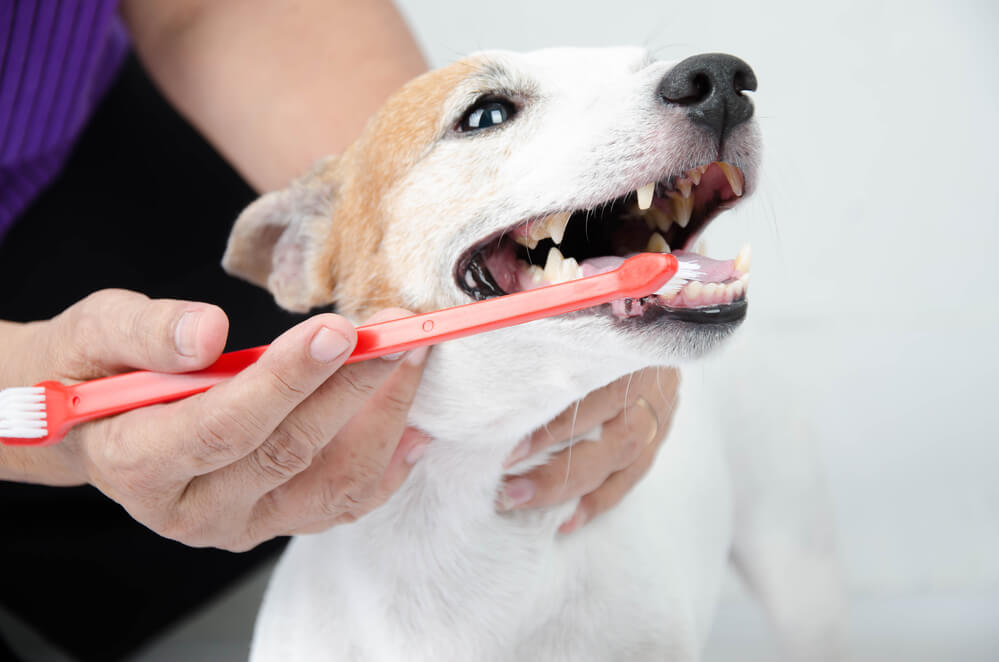As dog lovers, our furry friends mean the world to us. It’s why we look after all aspects of their health and well-being, including their dental hygiene. Keeping their teeth and gums healthy prevents things like gum disease and tooth decay. It also helps to control bad breath, something that all dog owners have experienced.
Some dogs seem to have worse breath than normal though. So how do you fix this problem? Can you give them one of your breath mints? Can dogs even eat breath mints made for us humans?
Let’s find out!
If your dog has eaten breath mints and he is acting abnormally or suffering allergy-like symptoms, be sure to call your vet, emergency clinic, or animal poison control center right away.
Are Breath Mints Bad for Dogs?
The short answer is yes. Most breath mints that are made for human consumption are not safe to give your furry friends. While most natural mint isn’t harmful to pets, there are ingredients used in breath mints that could really do some damage.
Most mints that are made for human consumption use artificial forms of mint that can be very toxic to your dog.
The main ingredient to be wary of is Xylitol, which is an artificial sweetener. Even in small amounts Xylitol is very harmful to dogs.
Menthol is another ingredient that can be toxic to them. So you want to stay away from any breath mint that has those ingredients in them, and here is why.
Xylitol
As mentioned above, Xylitol is an artificial sweetener that is used in sugar-free gum and mints. When a dog ingests this, it causes its body to suddenly release insulin. Just like in some humans, this can cause hypoglycemia, meaning blood sugar levels are lower than normal.
According to Veterinary Centers of America hospitals, the smallest amount of Xylitol will cause dogs to have seizures, liver failure, and can even cause death. The effects of ingesting Xylitol can occur within ten minutes to an hour.
If you think your dog has eaten Xylitol, take him to your vet or an emergency animal hospital immediately.
Other products that may contain Xylitol include:
- some peanut and nut butters
- toothpaste & mouthwash
- chewable vitamin supplements for human consumption
- baked goods
- sugar-free desserts
- baked goods
Menthol (or Peppermint Oil)
Menthol is the other ingredient to avoid and it is used in some breath mints. It’s a chemical that can cause irritation in the tissues in your dog’s digestive tract and mouth. If a dog ingests something with menthol as an ingredient, it can cause a stomach ache, vomiting seizures, and respiratory problems.
In puppies, it can cause respiratory depression because it impacts the ability of their lungs to exchange oxygen.
Does this mean that you have to put up with your dog’s stinky breath? Not at all! There are products that are vet recommended and made to combat doggie bad breath, such as Minties Dental Bones.
Another good choice is Pets Are Kids Too – Pet Dental Spray. Both products are made specifically for our furry friends with no harmful ingredients.
What Happens if a Dog Eats a Mint?
Back to human mints! According to the Pet Poison Helpline, it takes 0.05 grams per pound of your dog’s body weight to cause poisoning.
Breath mints normally have anywhere between 0.22 to 1.0 grams of Xylitol in one mint. So if your dog weighs 10 pounds, it only takes one mint to cause poisoning. The more mints ingested, the more toxic and life-threatening the situation becomes for your pet.
Signs of hypoglycemia in your dog will include:
- weakness,
- tremors,
- vomiting,
- loss of coordination,
- seizures,
- tremors,
- lethargy,
- difficulty walking,
- and coma.
So, What Kind of Mint Can Dogs Eat?
Mint (scientific name Mentha spp), otherwise known as garden mint, belongs to the Lamiaceae family. The two most common types of mint are peppermint and spearmint. The mint family is quite large and you will find all sorts of mint, like apple mint and lavender mint. In fact there are about 25 different species of mint.
One mint to steer clear of is the Pennyroyal mint, pictured below, since this can lead to liver failure and in extreme cases, it can be fatal – as was seen in this 1992 case study. This is one that can be toxic to both humans and pets in even very small doses because of the the chemical which it contains – pulegone.
Another mint that is considered toxic to dogs and should be avoided as well is the Perilla mint, often used in Asian cooking.
Most forms of mint are harmless to your pet. Some mint species in its natural form are quite safe in fact, unless it is in high concentrations, as you see with essential oils.
According to the Farmer’s Dog Digest, Peppermint (mentha balsamea) is actually beneficial for dogs in the right amounts and may soothe an upset stomach or nausea in your dog, but, in too large doses it can cause kidney and liver issues. Similarly, spearmint (mentha spicata) has been used to repel fleas as well as freshen a dog’s breath. Again, large doses can cause vomiting and diarrhea.
Can Dogs Eat mint Lifesavers?
While mint Lifesavers don’t use the toxic ingredients found in most human mint products, they are really high in sugar and, from a dental standpoint, aren’t good for your dog. The artificial sweetener used in the sugar-free version of Lifesavers is sucralose, which has been tested and found to be safe for dogs.
What Can I Give My Dog For Bad Breath?

There are a variety of natural methods and ingredients that can help freshen your dog’s breath.
Carrots
Over time, your dog’s teeth get plaque buildup, which can be hard to remove. Unless your dog likes having its teeth brushed regularly, this can be a problem. Letting your dog chew on a carrot will help break down any plaque buildup on their teeth and is a healthy treat for them.
Coconut Oil
One way to reduce the amount of bacteria buildup in your dog’s mouth and gut is to add coconut oil to their food. It has natural anti-fungal, antibacterial, and antiviral properties and can help reduce kidney and periodontal disease. If you can brush your dog’s teeth, coconut oil also makes a natural toothpaste.
Lemons
Lemons, like all citrus fruit, are high in acids that kill off bacteria. It acts as a deodorizer as well. Simply add a few drops of natural lemon juice to your pup’s water daily.
Apple Cider Vinegar
Apple cider vinegar is widely used for a variety of health benefits in humans. It is also a safe alternative for pets. Aside from being rich in calcium, magnesium, potassium, and other minerals important for your dog’s health, it is high in acetic and malic acid. These both kill off the bacteria that cause bad breath.
Yogurt
Does your dog have that rotten egg smell on its breath? This is a result of hydrogen sulfide being excreted by the bacteria living in your dog’s mouth. Yogurt reduces this sulfur compound and helps combat bad breath and it is high in calcium, which is beneficial to your dog. Twice a day, mix a bit of yogurt into your dog’s food.
Probiotics
Not all bacteria are bad. There are natural bacteria that are beneficial, like probiotics. These are microorganisms that can combat bad breath. Just be sure that the product you use is a dog-specific probiotic brand.
If In Doubt Seek Emergency and Veterinarian Help
If you think your dog has ingested something that is toxic, or they are displaying abnormal behavior (lethargy, vomiting, etc) you should get help immediately, either from your veterinarian, an animal hospital, or the Pet Poison Helpline. The quicker you get help, the better the chances of a full recovery for your dog.
Be sure to bring the packaging of whatever your dog has ingested with you.
Pet poison control centers are available 7 days a week, 24 hours a day. Some may charge a small fee for using them.
Pet Poison Hotline
Tel: 800-213-6680
http://www.petpoisonhelpline.com/
ASPCA Animal Poison Control Center
Tel: 888-426-4435
https://www.aspca.org/pet-care/animal-poison-control.
You Might Also Like
Medical Disclaimer: If you are concerned about your pet, visit or call your veterinarian – he/she is your best resource to ensure the health and well-being of your dog. This information is for informational purposes only and is not intended to help assess or manage animal exposures or as a substitute for the professional advice of, or diagnosis or treatment by, your veterinarian with respect to your pet.
Like this? SUBSCRIBE for more actionable tips!
Join our free mailing list for: Giveaways + Deals + Exclusive Content + Sneak Peeks, Reviews + More


